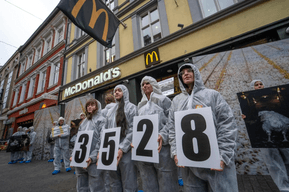
Historic victory for animals – Norway ends the farming of fast-growing chickens
January 23, 2026
February 21, 2022
The gassing and grinding of chickens alive, cramped cages and breaking bones – these are just some of the horrors of the industrial breeding of hens and chickens, brought to light by journalist Filip Folczak’s report “Śmierć kur” (“The Death of Hens”).
First, a brutal selection of chicks, where only female chicks get to live. Then, the birds are jammed into cages – some of them will die inside them. They lose their feathers and hurt themselves against the cage bars. Some breeders also trim their birds’ beaks so that they cannot attack each other. In a yard, a hen may live up to 10 years, in a cage – 1.5 years at most.
The material gathered by the reporter was published on 5 February along with footage from investigations carried out by Otwarte Klatki. It deals with a number of problems of the industrial breeding of laying hens and broiler chickens, including poor animal welfare in cage rearing, chick culling, improper loading of broiler chickens for transport, and the negative impact of farms on local communities.
Following the report, Otwarte Klatki submitted a notice of suspected criminal offence, counting on the law enforcement agencies to take decisive action in this matter.

The report reverberated widely, sparking media outrage.
“Fast-growing broiler chickens reach the weight of 2 to 2.5 kilograms within 6 weeks. If human children grew at that rate, a five-year-old would weigh 150 kilograms,” says Otwarte Klatki activist Maria Madej. “Broiler chickens grow at such an alarming rate, making them unable to support their own body weight. Their internal organs, including the heart, have no chance of functioning properly.”
PSL (Polish People’s Party) MP Dariusz Klimczak commented that abandoning cage farming is “an inevitable development, and it is only a matter of how Poland and other EU countries prepare for it.”

Animal welfare issues are the subject of public debate both in Poland and throughout the world. The European Commission is going to work on a proposal to ban cage farming altogether.
When asked to comment on this matter, Minister of Agriculture Henryk Kowalczyk showed his ignorance and lack of empathy for animals claiming that caged hens do not suffer because they don’t know a different life. He also addressed the European Commission’s planned ban on caged farming, which is the result of the European Citizens' Initiative “End the Cage Age”, saying that he will not agree to phasing out caged farming in Poland.
The Greens MP Małgorzata Tracz commented that “it is appalling that a person with no respect for animals is the minister of agriculture. The words of Minister Kowalczyk contradict the first article of the Animal Protection Act.”
In response to the report, the farming industry published a statement accusing TVN of manipulating facts.
Such false accusations are often raised after high-profile reports revealing the systemic cruelty of industrial animal farming.
Otwarte Klatki have been campaigning for abandoning the caged farming of laying hens for years. Thanks to the “Jak One To Znoszą” campaign, some of the largest companies in Poland have declared they will no longer sell cage eggs. The percentage of caged eggs in the whole egg industry is consistently decreasing, and more and more people decide not to buy eggs if their production causes animal suffering.
Magda Łapińska is Digital Marketing Specialist in Otwarte Klatki (Poland). She coordinates the work of many social media teams, creates content for social media and trains volunteers in this area. She is also responsible for online marketing (advertising, analytics, SEO, content marketing).
